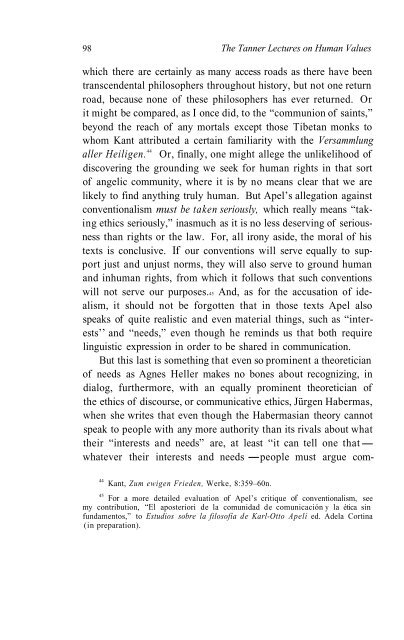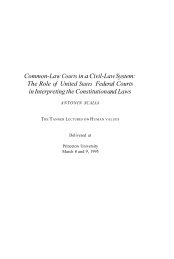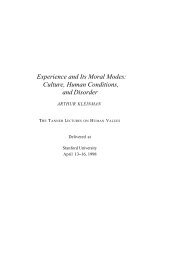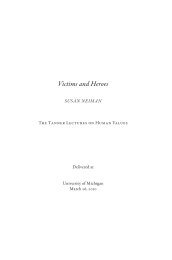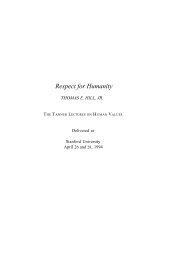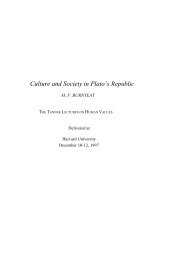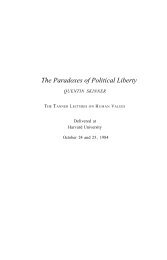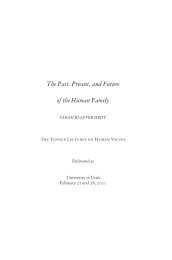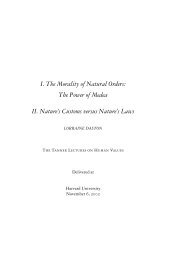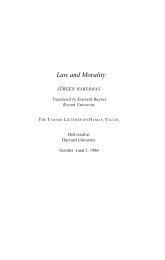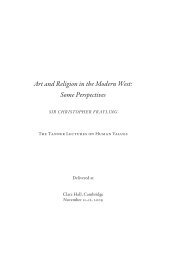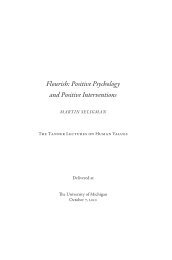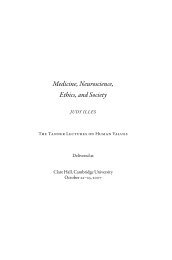Muguerza, Javier - The Tanner Lectures on Human Values
Muguerza, Javier - The Tanner Lectures on Human Values
Muguerza, Javier - The Tanner Lectures on Human Values
Create successful ePaper yourself
Turn your PDF publications into a flip-book with our unique Google optimized e-Paper software.
98 <str<strong>on</strong>g>The</str<strong>on</strong>g> <str<strong>on</strong>g>Tanner</str<strong>on</strong>g> <str<strong>on</strong>g>Lectures</str<strong>on</strong>g> <strong>on</strong> <strong>Human</strong> <strong>Values</strong>which there are certainly as many access roads as there have beentranscendental philosophers throughout history, but not <strong>on</strong>e returnroad, because n<strong>on</strong>e of these philosophers has ever returned. Orit might be compared, as I <strong>on</strong>ce did, to the “communi<strong>on</strong> of saints,”bey<strong>on</strong>d the reach of any mortals except those Tibetan m<strong>on</strong>ks towhom Kant attributed a certain familiarity with the Versammlungaller Heiligen. 44Or, finally, <strong>on</strong>e might allege the unlikelihood ofdiscovering the grounding we seek for human rights in that sortof angelic community, where it is by no means clear that we arelikely to find anything truly human. But Apel’s allegati<strong>on</strong> againstc<strong>on</strong>venti<strong>on</strong>alism must be taken seriously, which really means “takingethics seriously,” inasmuch as it is no less deserving of seriousnessthan rights or the law. For, all ir<strong>on</strong>y aside, the moral of histexts is c<strong>on</strong>clusive. If our c<strong>on</strong>venti<strong>on</strong>s will serve equally to supportjust and unjust norms, they will also serve to ground humanand inhuman rights, from which it follows that such c<strong>on</strong>venti<strong>on</strong>swill not serve our purposes.45 And, as for the accusati<strong>on</strong> of idealism,it should not be forgotten that in those texts Apel alsospeaks of quite realistic and even material things, such as “interests’’and “needs,” even though he reminds us that both requirelinguistic expressi<strong>on</strong> in order to be shared in communicati<strong>on</strong>.But this last is something that even so prominent a theoreticianof needs as Agnes Heller makes no b<strong>on</strong>es about recognizing, indialog, furthermore, with an equally prominent theoretician ofthe ethics of discourse, or communicative ethics, Jürgen Habermas,when she writes that even though the Habermasian theory cannotspeak to people with any more authority than its rivals about whattheir “interests and needs” are, at least “it can tell <strong>on</strong>e thatwhatevertheir interests and needs - people must argue com-44 Kant, Zum ewigen Frieden, Werke, 8:359–60n.45 For a more detailed evaluati<strong>on</strong> of Apel’s critique of c<strong>on</strong>venti<strong>on</strong>alism, seemy c<strong>on</strong>tributi<strong>on</strong>, “El aposteriori de la comunidad de comunicación y la ética sinfundamentos,” to Estudios sobre la filosofía de Karl-Otto Apelí ed. Adela Cortina(in preparati<strong>on</strong>).


